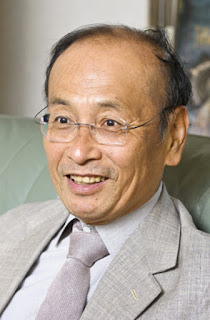Information from our reader, Prema
posted on our blog – October 14, 2012 –
Normal
0
10 pt
0
2
false
false
false
EN-US
JA
X-NONE
$([{£¥‘“〈《「『【〔$([{「£¥
!%),.:;?]}¢°’”‰′″℃、。々〉》」』】〕゛゜ゝゞ・ヽヾ!%),.:;?]}。」、・゙゚¢
English translation of an excerpt from a
Japanese article: Neta Rika – October 10, 2012 –
Normal
0
10 pt
0
2
false
false
false
EN-US
JA
X-NONE
$([{£¥‘“〈《「『【〔$([{「£¥
!%),.:;?]}¢°’”‰′″℃、。々〉》」』】〕゛゜ゝゞ・ヽヾ!%),.:;?]}。」、・゙゚¢
Citizens’
Voice Such As Anti-Nuclear Demonstration Acts As A Counterbalance To U.S. Pressure
Mr. Ukeru Magosaki
(Photo taken by Taro Inoue)
Mr. Ukeru Magosaki, called “one and only
national strategist the Foreign Ministry has ever produced,” says, “Shigeru
Yoshida, who is considered to be a politician who fought a battle with U.S.,
was also one of U.S. puppets.”
Did you feel any pressure from the U.S. through your work in the
Foreign Ministry?
“Of course, I felt it frequently. The biggest pressure was felt at the time of
development of oilfield in Iran. A
decade ago Japan acquired the right to develop the Azadegan oil field in Iran. However, the pressure from the U.S., which
had a hostile relationship with Iran, forced Japan to abandon the right. At that time, Vice President Dick Cheney
(then) directly got involved in excluding the Japanese person in charge from
job site.”
It is a problem that a system to bow to U.S. wishes has been
established in Japan, isn’t it?
“That’s right. It dates back to the occupied period. To give an example, Shigeru Yoshida served as
prime minister from the occupied period to post-independence. He is considered to be a politician who
fought a battle with the U.S., but if examining various documents carefully, it
is found that he bowed to U.S. wishes.
That is no surprise at all.
Occupied Japan had no freedom. At
that time, it was impossible for anybody to reach the center of power unless he
bowed to U.S. wishes. The problem is
that Shigeru Yoshida remained to be prime minister even after Japan regained
its independence by signing the San Francisco Peace Treaty. This left behind a mechanism which forces
Japan’s politics to bow to U.S. pressure.”
Your book says that the situation everywhere is the same as in the political
world and those who had gained power with backing of U.S. remained in the
prosecution, the media, the bureaucracy and the university even after Japan’s
independence.
“Especially the Special Investigation
Department has played a role in sending into political limbo the politicians
who often have problems with U.S. The
predecessor of the department was “Hidden, Hoarded Goods Incident Investigation
Department.” In occupied Japan, it was
organized to find out the hidden assets of the Japanese Imperial Army and put
them under the control of GHQ. In a
word, it was an investigation organization to make GHQ a present of Japan’s treasure.”
However, it was more than 65 years ago. It is unlikely that the Special Investigation
Department is under the thumb of the U.S.
“As is the case with Shigeru Yoshida, they
didn’t get shut of it at the time of independence. It is succeeded by into the elite of the
Department to have a special connection with the U.S. For example, the prosecutor in charge of
Ozawa case worked as the first secretary at the Japanese Embassy in U.S. The person in charge of questioning in the
Lockheed Scandal, which led to the arrest of Kakuei Tanaka, was also the first
secretary at the Embassy. The person who
was the prosecutor general at the scandal got involved with the Sorge case and
Shimoyama case, where U.S. was active behind the scenes.
If such system has been firmly established, is there any hope in
years to come?
“I think that the anti-nuclear
demonstration is the very hope. In the
struggle over the U.S.-Japan Security Pact, left-wing activists got financed by
top figures of the business world who was apparently influenced by U.S., to
organize groups of demonstrators.
However, this time is different.
Ordinary citizens join in demonstrations though they are not mobilized
by anybody. U.S. cannot put direct
pressure on Japanese citizens. If more
and more citizens raise their anti-nuclear voice, it would act as a
counterbalance to U.S. pressure.
